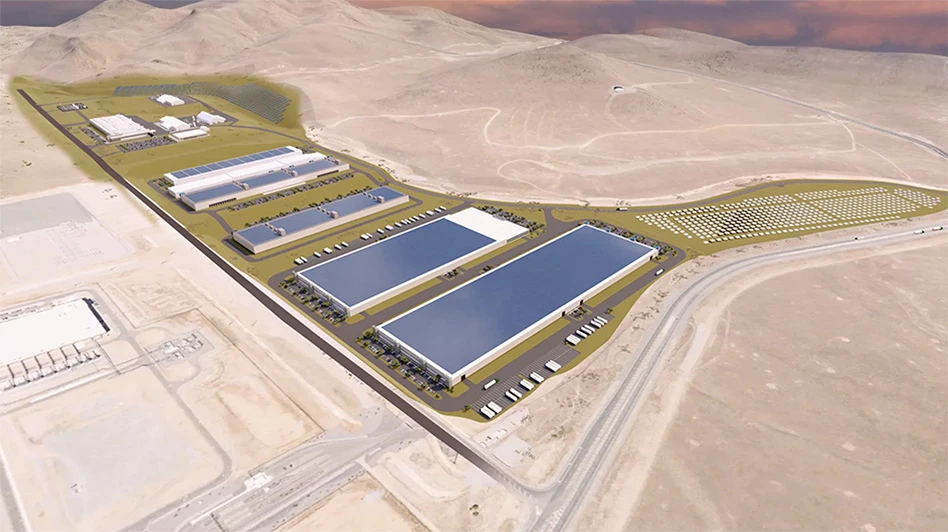
Rendering courtesy of Redwood Materials
The United States Department of Energy (DOE) has announced that its Loan Programs Office (LPO) has conditionally approved a loan commitment of $2 billion to Nevada-based Redwood Materials to expand its battery materials recycling and production campus in McCarran, Nevada. The expansion also will allow Redwood to process mined virgin materials at the site.
According to the DOE, the loan will help “support the growing electric vehicle (EV) market in America.” The department says the expanded campus would become “the first domestic facility to support production of anode copper foil and cathode active materials in a fully closed-loop lithium-ion battery manufacturing process by recycling end-of-life battery and production scrap and remanufacturing that feedstock into critical materials.”
Redwood Materials also announced late last year its intention to create a second production site in South Carolina. That facility also is being designed to produce battery-grade lithium, cobalt, nickel and copper.
Although it has positioned itself as a recycling firm, in its South Carolina announcement Redwood Materials indicated it also will be processing virgin materials at the planned facility. “With increasing demand for lithium-ion batteries, the ability to import raw materials, which we will also be able to refine on this site, presents a significant advantage,” the company said at that time.
Redwood Materials and the DOE have reinforced Redwood’s intention to also use virgin materials in the latest LPO loan commitment announcement. “Redwood Materials will use both new and recycled feedstocks—comprised of critical materials like lithium, nickel and cobalt—to produce approximately 36,000 metric tons per year of ultra-thin battery-grade copper foil for use as the anode current collector, and approximately 100,000 metric tons per year of cathode active materials,” the DOE says.
Considering the lengthy timeline before large numbers of EV batteries begin reaching the end of their useful lives and its location in Nevada, it is not surprising Redwood Materials is putting in place virgin materials refining technology in McCarran.
In mid-January, the same DOE LPO loan program announced a $700 million conditional commitment to go toward the Rhyolite Ridge Lithium-Boron mining project in western Nevada. According to the DOE, that project (undertaken by a partnership between Australian and South African mining companies) “could potentially support production of lithium for approximately 370,000 EVs each year.”
That DOE announcement indicates an offtake agreement will have the Rhyolite Ridge materials heading to a battery partnership that includes the Ford Motor Co. and Toyota Motor Corp. However, other sources of mined lithium in Nevada, according to Nevada Lithium Resources Inc., include the currently operational Silver Peak Mine and proposed efforts in the Bonnie Claire and Thacker Pass regions of Nevada.
Redwood Materials has offtake agreements or end-of-life battery supply agreements with several existing and prospective EV battery makers in the U.S., including Panasonic Energy of North America (which works in cooperation with a Tesla Gigafactory); Toyota Motor North America; Volkswagen Group of America; and Audi; The company also has an ownership stake in California-based electronics recycling firm ERI.
The DOE adds, “This latest conditional commitment builds upon several recent Advanced Technology Vehicles Manufacturing (ATVM) loan announcements, including Syrah Vidalia, Ultium Cells and Rhyolite Ridge, that support domestic manufacturing of advanced technology vehicles, qualifying components and materials that improve fuel economy.”
The percentage of recycled-content metals produced in McCarran will grow along with EV market share, according to the DOE. “This latest conditional commitment comes as the EV market in America is expected to grow substantially along with U.S. automakers and component suppliers working to lead the world in EV manufacturing. The share of annual battery-powered electric vehicles is expected to rise from about 2 percent in 2020 to 35 percent by 2030.”
The DOE adds, “To meet increased demand for lithium-ion batteries, recycling will play an increasingly important role in battery materials production. On average, Redwood can recover greater than 95 percent of the critical battery elements in an end-of-life battery (including lithium, nickel, cobalt, manganese and copper), and then use those metals to manufacture anode and cathode components domestically for U.S. battery cell manufacturers.”
In addition to EV batteries, the DOE says Redwood Materials' Nevada operation can recycle end-of-life batteries from consumer electronics including cell phones, laptop computers, power tools and other battery-powered items.
“By lowering the cost of the critical materials necessary to produce lithium-ion batteries using recycled materials, EVs have the potential to become more accessible and affordable to consumers, " the DOE says. "The circular supply chain supported by this project is an example of how the U.S. EV industry can support sustainable, long-term lithium-ion battery production.”
Latest from Recycling Today
- Lautenbach Recycling names business development manager
- Sebright Products partners with German waste management equipment company
- WasteExpo transitions to biennial format for enhanced experiences
- Study highlights progress, challenges in meeting PCR goals for packaging
- Washington legislature passes EPR bill
- PureCycle makes progress on use of PureFive resin in film trials
- New copper alloy achieves unprecedented high-temperature performance
- Gränges boosts profits and sales volume in Q1 2025





